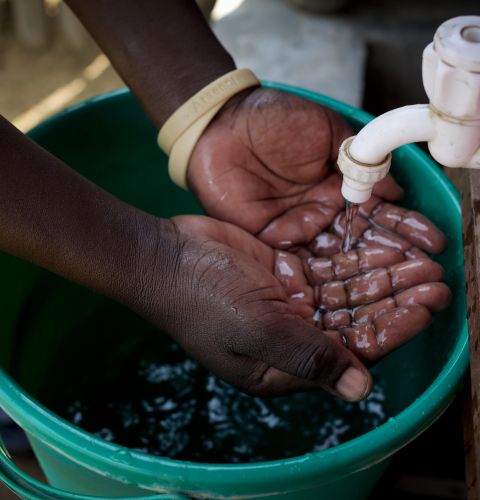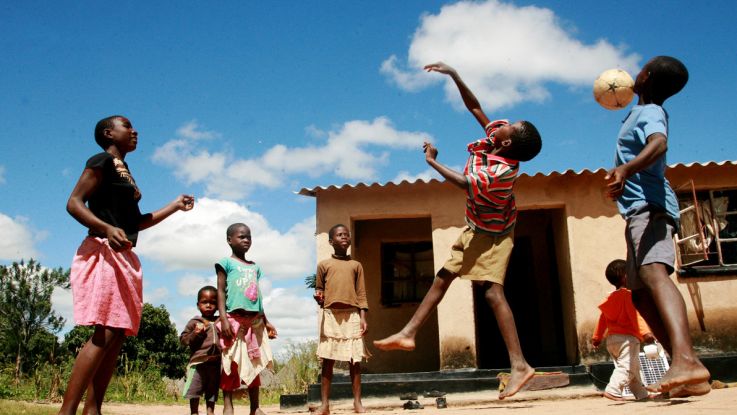Ebola virus outbreak in West Africa 2014-16
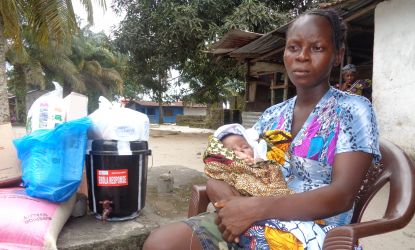
The impact of Ebola on mothers and children
Princess Paye, 20, is from Monrovia, Liberia. Her husband, Joseph, contracted Ebola while she was heavily pregnant with her first child.
"Joseph got weaker and sicker by the day," she said. "I feared that it might be Ebola after hearing the signs and symptoms at a community meeting. We had been advised by the community chairman that all sick people should be reported so I reported that Joseph was ill and he was taken to a treatment centre.
"I was now left all alone in the house. I was no longer allowed to fetch water from the pump, or go to the market or buy anything. No one wanted to have anything to do with me. A week later I went into labour. I called for help from the neighbours but no one came because they were afraid they could catch Ebola from me."
Princess was told that her husband passed away on the same day that she gave birth. She and her baby, Miracle, were declared Ebola free.
ActionAid supported Princess by ensuring that she has food, sanitary towels, and a kit to help protect herself and Miracle from the virus, including hand sanitiser, chlorine and a handwashing bucket.
Princess lost her partner Joseph to the Ebola virus. He died on the same day that she gave birth to their baby girl.
ActionAid
About the Ebola virus
What is Ebola?
Ebola virus disease, formerly referred to as Ebola haemorrhagic fever (EHF), is an acute, serious illness. The 2014-2016 outbreak in West Africa had a fatality rate of around 50%.
The first outbreaks of Ebola occured in Sudan and the Democratic Republic of the Congo in 1976.
How is Ebola spread?
The Ebola virus is found in the blood, body fluids or organs of a person or animal who is infected. It can be spread by touching someone with the infection who has symptoms or someone who has recently died, by cleaning up bodily fluids, by having sex with an infected person without using a condom, and by handling or eating uncooked bushmeat.
The incubation period for Ebola virus (the time between infection with the virus to onset of symptoms) is two to 21 days. Humans are not infectious until they develop symptoms.
Ebola symptoms
The first symptoms of Ebola virus include a high temperature, headaches, joint and muscle pain and a sore throat. These symptoms can then develop into diarrhoea, vomiting, a rash, stomach pain and reduced kidney and liver function. An infected person may bleed internally, and they may also bleed from the ears, eyes, nose or mouth.
How is Ebola treated?
There's currently no licensed treatment or vaccine for Ebola, but some potential new vaccines and drug therapies are under development. However, early interventions of rehydration and treatment of the symptoms improves the chances of survival.2
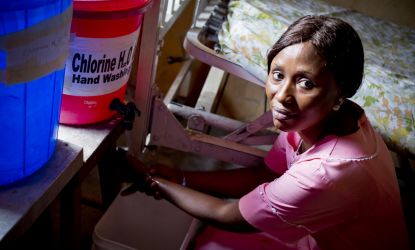
Supporting health workers to tackle Ebola
Mariama, 36, is a health worker in Bo District in Sierra Leone. Ebola had a deep impact on her community, as many health workers contracted the disease and died.
This meant that other people who were infected with Ebola were too scared to go to the clinic to get treatment.
"Initially we had no protective equipment so we were very scared to touch patients and be able to look after them," Mariama says.
We were supplied with chlorine, soap and gloves by ActionAid, so we were able to keep doing our jobs."
Mariama washes her hands in chlorine in the health clinic in the village of Mbundoru in Sierra Leone.
Kate Holt/ActionAid
ActionAid's response to Ebola in Sierra Leone
ActionAid Sierra Leone focused on ensuring that families who had been affected by Ebola had access to food, and that vulnerable children were able to continue their education.
- In collaboration with the Ministry of Social Welfare, Gender and Children's Affairs, ActionAid Sierra Leone gave essential food supplies to 12,500 people, including 700 orphans and vulnerable children.
- We also helped support women's livelihoods which were badly hit during the crisis, helping over 4,800 women with a Village Savings and Loans scheme, and through setting up soap making projects.
- Many schools were forced to close during the outbreak. We gave learning materials to over 1,400 orphaned and vulnerable children so that they were able to continue their education during the outbreak, and eventually return to school.
- We trained 7,000 students on hygiene and sanitation, to help stop the spread of the virus, and provided schools with hand washing stations.
- We also trained 175 teachers, mother's club members and health care workers on how to provide pyschosocial support to communities who had been traumatised by the effects of the outbreak.
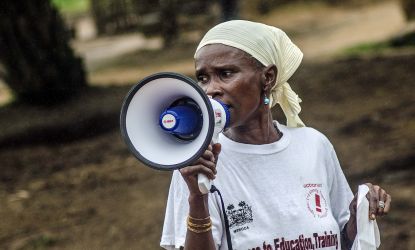
Raising awareness of how to stop Ebola
When the Ebola outbreak began in Sierra Leone, ActionAid started rapid outreach training in rural communities about how to stop the spread of the virus.
Hawa Jalloh, who has volunteered for ActionAid since 2007, was one of the local women we trained to raise awareness of Ebola.
"Before the training we didn't believe it. No one could see it, they thought... the government puts you in a car and sprays you and you die," she says. "But they told us Ebola is real. When I came back I gathered all the elders. I told them it is real. We told them the government is fighting to push it from the country, as it is bad disease."
Hawa went from house to house visits, informing families about how best to avoid the disease. "Ever since I told them about Ebola, this familiy has been leaving a bowl of water outside their house for hand washing" she says proudly, indicating a nearby home of mud and corrugated iron.
Hawa raises awareness of Ebola in her community.
Tommy Trenchard/ActionAid
ActionAid's response to Ebola in Liberia
ActionAid Liberia focused on supporting schools and communities with Ebola prevention and control kits, and ensuring that the most vulnerable people including women, orphans and survivors had access to psychosocial support and livelihood support.
- With our local partners, we provided 31 schools with Ebola prevention and control kits. This included disinfectants, safety gear and hand washing stations to prevent the spread of the virus. We trained 475 community members to maintain and repair the hand washing stations.
- We established water sanitation and hygiene (WASH) activities in schools and communities, reaching over 3,000 people with information on good hygiene practices and sexual reproductive health and rights.
- ActionAid Liberia and our local partners provided psychosocial support to women, girls orphans and vulnerable children in 45 communities. As a result, women from 36 of the counties reported that there was a reduction in stigma amongst Ebola survivors and survivors of gender based violence. One women's centre has helped over 2,600 women through skills training and counselling.
- 500 community leaders, including town chiefs, women leaders, youth leaders and health workers, received training in how to address stigma and support the most vulnerable.
- We supported over 2,300 women, young people and women with disabilities to recover their livelihoods. This included soap-making projects, and a women's saving loan to help other vulnerable women within the communities.
The long term impact of Ebola
Health services in West Africa were hit hard by the 2014-16 outbreak, with many health workers lost to the disease and already weak systems and infrastructure put under enormous strain. Schools worked to accommodate students who were forced to miss a year of school during the outbreak. Years of progress were lost as economies and markets slowed down. Overall, the disease left the poor even poorer.
ActionAid Liberia and ActionAid Sierra Leone continue to work with communities in the long term. To tackle the ongoing impacts of Ebola, we're helping orphans resume their schooling, we're supporting survivors to find income sources through farming and animal rearing, and we're tackling the stigma faced by families who were impacted by the disease.
Page updated 26 January 2026
